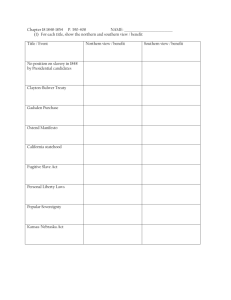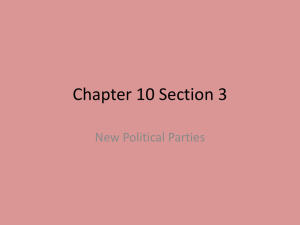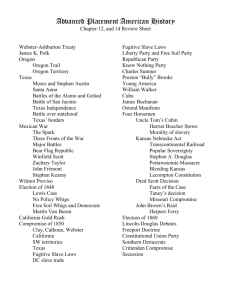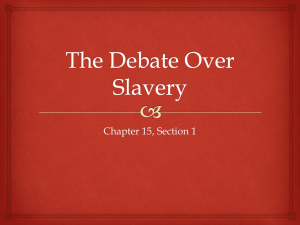CHAPTER 18 POWERPOINT NOTES
advertisement
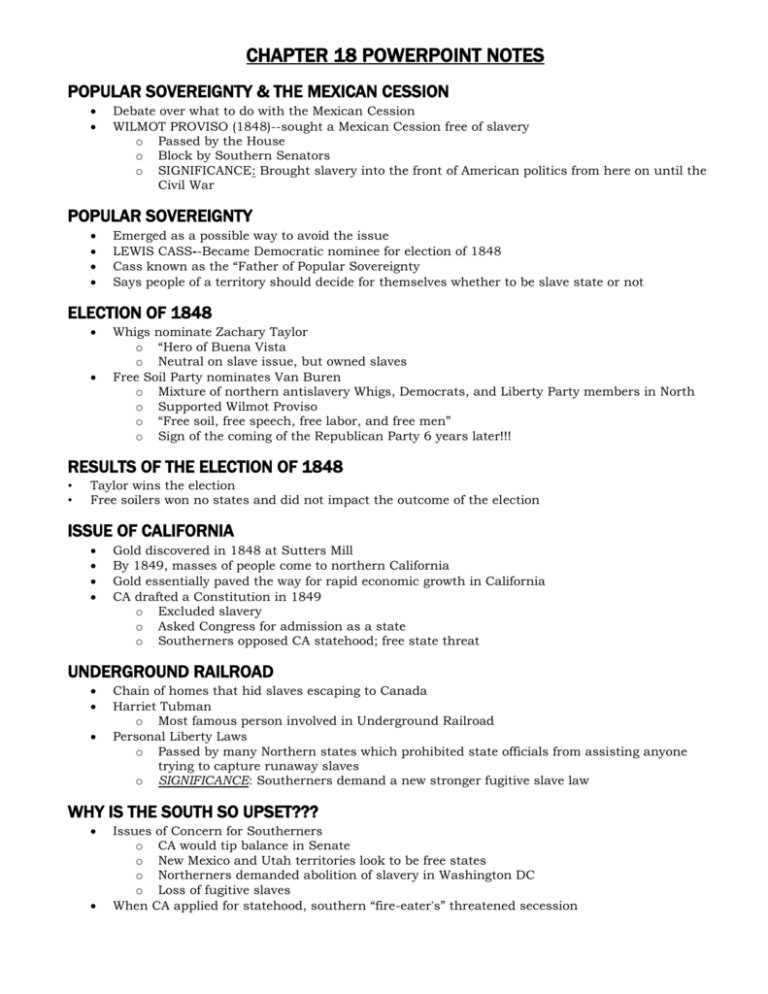
CHAPTER 18 POWERPOINT NOTES POPULAR SOVEREIGNTY & THE MEXICAN CESSION Debate over what to do with the Mexican Cession WILMOT PROVISO (1848)--sought a Mexican Cession free of slavery o Passed by the House o Block by Southern Senators o SIGNIFICANCE: Brought slavery into the front of American politics from here on until the Civil War POPULAR SOVEREIGNTY Emerged as a possible way to avoid the issue LEWIS CASS--Became Democratic nominee for election of 1848 Cass known as the “Father of Popular Sovereignty Says people of a territory should decide for themselves whether to be slave state or not ELECTION OF 1848 Whigs nominate Zachary Taylor o “Hero of Buena Vista o Neutral on slave issue, but owned slaves Free Soil Party nominates Van Buren o Mixture of northern antislavery Whigs, Democrats, and Liberty Party members in North o Supported Wilmot Proviso o “Free soil, free speech, free labor, and free men” o Sign of the coming of the Republican Party 6 years later!!! RESULTS OF THE ELECTION OF 1848 • • Taylor wins the election Free soilers won no states and did not impact the outcome of the election ISSUE OF CALIFORNIA Gold discovered in 1848 at Sutters Mill By 1849, masses of people come to northern California Gold essentially paved the way for rapid economic growth in California CA drafted a Constitution in 1849 o Excluded slavery o Asked Congress for admission as a state o Southerners opposed CA statehood; free state threat UNDERGROUND RAILROAD Chain of homes that hid slaves escaping to Canada Harriet Tubman o Most famous person involved in Underground Railroad Personal Liberty Laws o Passed by many Northern states which prohibited state officials from assisting anyone trying to capture runaway slaves o SIGNIFICANCE: Southerners demand a new stronger fugitive slave law WHY IS THE SOUTH SO UPSET??? Issues of Concern for Southerners o CA would tip balance in Senate o New Mexico and Utah territories look to be free states o Northerners demanded abolition of slavery in Washington DC o Loss of fugitive slaves When CA applied for statehood, southern “fire-eater's” threatened secession ATTEMPT AT COMPROMISE The Great Triumvirate o Henry Clay, John C. Calhoun, and Daniel Webster make an attempt to end the crisis Henry Clay o North should pass a more effective fugitive slave law o Supported by Stephen Douglas, the “Little Giant” John C. Calhoun o Felt Clay’s position was inadequate o Leave slavery alone, return runaway slaves, give South rights as a minority, and restore political balance Daniel Webster o Supported Clay o Gives famous “7th of March Speech” o Urged reasonable concession to the South o Opposed Congress legislating in the territories SIGNIFICANCE: Turned the North towards Compromise Abolitionists branded Webster a traitor William H. Seward o Opposed granting concessions to the South o Stated Christian legislators must obey God’s moral law first o “Slavery shouldn’t be allowed in western territories due to a ‘higher law’ than the Constitution” COMPROMISE OF 1850 Popular sovereignty in Mexican Cession Fugitive Slave law toughened Abolition of slave trade in Washington DC California admitted as a free state Texas given $10 million for disputed Mexican territory Pop-FACT ELECTION OF 1852 Democrats o Nominated Franklin Pierce o Sympathetic to Southern views o Acceptable to slavery wing of the party o Campaign in favor of Compromise of 1850 Whigs o Nominate General Winfield Scott o Party fatally split o Southern Whigs supported Fugitive Slave Law but doubted Scotts willingness to hold Compromise o Antislavery Whigs supported Scott but hated his support of the Fugitive Slave Law EXPANSIONISM UNDER PIERCE “Young America” o Pierce wanted to extend “Manifest Destiny” overseas Wanted to build a canal in Central America o Clayton-Bulwer Treaty--US and GB agreed that neither side would build and monopolize a new canal w/o the others consent Issues with Asia o Signed trade agreements with China o Sent US ships to force Japan to open up trade with US DESIRE FOR CUBA Cuba o Polk had offered Spain money for Cuba, Spain refused o South wanted Cuba for slavery OSTEND MANIFESTO--US secretly demanded Cuba for $130 million. If Spain refused, use force Plan backfired b/c of angry Northerners who saw it as a slaveholders plot GADSDEN PURCHASE Congress wanted a transcontinental railroad built Question should it be in the North or South? Best route seemed to be below the Mexican border In 1853, US purchased Mesilla Valley (in southern New Mexico and Arizona) from Santa Anna for $10 million Result: South now had the advantage KANSAS-NEBRASKA ACT OF 1854 Most important short term cause of the Civil War Stephen Douglas proposed splitting Nebraska territory into two states: Kansas and Nebraska o Slavery issue would be based on popular sovereignty o Kansas would probably be slave, Nebraska free Problems o 36-30 line created by Compromise of 1820 prohibited slavery o Kansas was above it o Solution? Repeal Compromise of 1820 o Fully supported by Southerners REACTION TO KANSAS-NEBRASKA ACT? Northerners shocked; saw Compromise of 1820 as sacred pact Northern reactions????? o Refused to honor Fugitive Slave Law o Antislavery movement grew stronger o North unwilling to compromise again BIRTH OF THE REPUBLICAN PARTY Formed in response to the Kansas-Nebraska Act Included Whigs, northern Democrats, Free-Soilers, and Know-Nothings Lincoln came out of retirement and ran for the Senate Became nations 2nd major political party overnight Republican Party not allowed in the South
